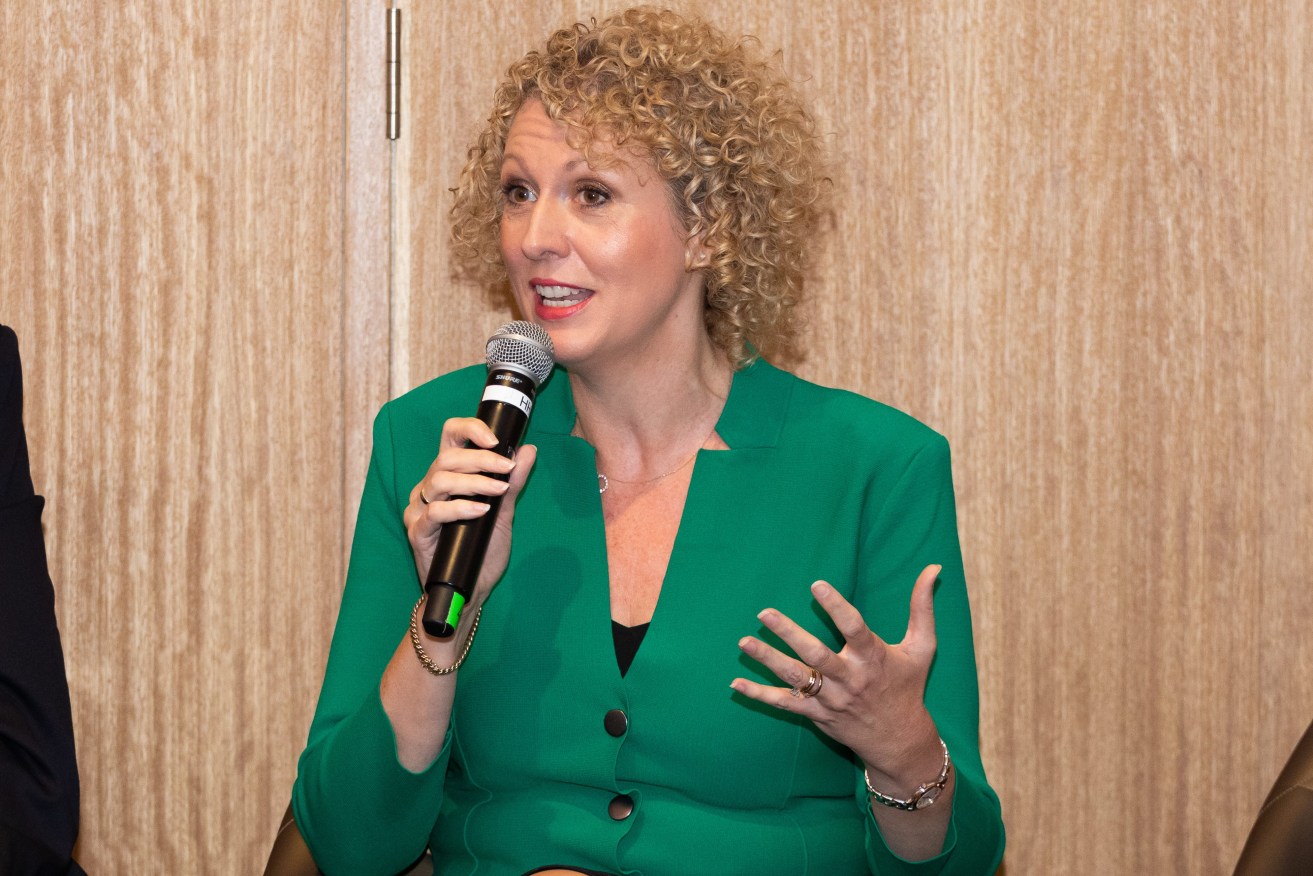Out of puff and out of touch: Business delivers Palaszczuk a brutal reality check
Queensland business leaders have delivered their forecasts for the year ahead, indicating strong headwinds for industry and the Palaszczuk Government in the run down to the 2024 election.


Chamber of Commerce and Industry Queensland CEO Heidi Cooper delivers a blunt assessment at a Queensland Futures Institute forum in Brisbane.
When Anthony Albanese was making his run for the Lodge last year, he declared Labor would be “kicking with the wind in the fourth quarter”.
Already looking out of puff after eight years in power, and further taxed by the calamities of a super-sized social shitstorm – crime, housing and health – Premier Annastacia Palaszczuk’s Labor government in Queensland can expect no such assistance in a bruising final cycle.
If the industry leaders who fronted a Queensland Futures Institute forum this week are on the money, the next 12 months needs the government to front up, clean up and speak up for business to get back on the front foot. Speakers cited a lack of clear vision, muddled regulatory frameworks and insufficient consultation as holding their sectors back.
Some may summarise this need for vision as “a plan” – possibly defined as a cohesive and coordinated document, clearly communicated to stakeholders and the community.
Not hard to do you would think, but perhaps near impossible when your government is stumbling and sucking in the big ones.
And that’s before we throw a Path to Treaty to reach and the hurly-burly of an Olympic Games to organise into the mix.
Andrew Barger, economics policy director at the Queensland Resources Council, said the outlook was “spectacularly good” for Queensland going by the market fundamentals.
India wants to double steel production, Tesla and BMW are writing cheques for companies to produce battery metals and the world’s attention has shifted to Queensland as a place that holds the resources that will help industrialised economies decarbonise, he told guests in Brisbane on Thursday.
“It should be all silver linings to happiness,” Barger said.
“But there’s this sort of mysterious response where prices are really strong, and we’re really not seeing the supply response.
“And I think that’s to do with the regulatory uncertainty, that churn of whether it’s coal royalties or gas price caps. I’m not going to mention metals because they haven’t been whacked yet. But it’s a really interesting time where the industry is sort of floundering a little bit.”
Barger said showcasing a “carbon positive Olympic games” in 2032 would remain a pipe dream unless “policy stability” was achieved.
“We’re going to need a whole stack of transmission batteries generation,” he said.
“A lot of those investments will need to be made and the people that are writing the cheques are the same people that have put the pens back in the pocket in the resource industries at the moment.
“If we can build some better engagement with government, if we can start to talk sensibly about policy outcomes then there’s some really good times ahead for Queensland, but at the moment, we seem to be just changing which foot we’re shooting ourselves in.”
Chamber of Commerce and Industry Queensland CEO Heidi Cooper said the recovery from Covid and now soaring interest rates and workforce shortages were a continuing drag on industry across the board, despite the prospects for “phenomenal growth” in Queensland over the next decade.
She said the latest batch of pulse data captured by her organisation, a gauge of business sentiment that has been gathered for decades, showed a subdued environment, where the potential riches of tomorrow seemed out of reach.
“What we heard businesses saying this time was we’re uncertain and not necessarily confident about what things look like moving into the future,” Cooper said.
“What we need to ensure is that there is planning and investment to ensure that the business community can take up these opportunities, because there is great opportunity ahead.”
An almost forlorn Queensland Tourism Industry Council CEO Brett Fraser said tourism operators could see domestic visitors, who flooded Queensland when international borders were restricted, dry up in 2023.
While 2021 was regarded as a year of recovery after Covid lockdowns, last year saw the domestic tourism market grow from $19 billion in 2019 to $25 billion.
Fraser is worried visitor numbers will abruptly return to pre-pandemic levels this year, which was coming off a decade when Queensland tourism was losing market share to just about every other region in the country.
“So, the domestic market replaced the international market almost entirely last year,” he said.
“Where we are today looking forward is probably the most uncertain time that I think we’ve ever had.
“What we’re predicting is that there’ll be a lot more outbound tourism out of Australia before inbound international tourism comes back to Australia.
“We’re predicting the domestic tourism market will drop so we’ll lose the gain that we had over the last year and it will not be replaced by the international market at the same time.”
As food security fears heightened during the peak of the pandemic, Queensland Farmers Federation CEO Jo Sheppard said pressures on the agriculture sector and food supply chains had barely been alleviated.
Like the resources sector, she said, conditions seasonally have been among the best in recent memory, but farmers are struggling to take advantage due to high input costs and chronic labour shortages.
“We’ve seen input costs like fuel and fertiliser increase over 120 per cent in the last two or three years,” she said.
“The workforce crisis is not a shortage, it’s a crisis. We’ve got farmers who are working around the clock. We actually have farmers who are not planting a crop or not planting a certain crop this season because they have no confidence that they’re going to be able to get that crop off.
“And then we’ve also seen some pretty extensive flood events.
“It’s a bittersweet place that we’re in, but I don’t think that’s any different to the other industries that we’re hearing from today.”
InQueensland is the media partner of the Queensland Futures Institute.












